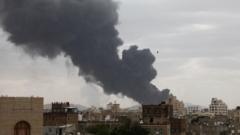Lebanon’s new finance minister, Yassine Jaber, faces an uphill battle to implement vital governance changes that will attract needed international financial assistance. After a devastating war with Israel and Hezbollah, the country lies in ruins and is in desperate need of reconstruction funds. However, foreign donors demand strict reforms, including addressing Hezbollah's militia presence, as a prerequisite for substantial aid.
Lebanon Faces Urgent Need for Reforms to Secure International Aid

Lebanon Faces Urgent Need for Reforms to Secure International Aid
The World Bank estimates a daunting $11 billion needed for Lebanon's reconstruction after recent conflicts, emphasizing the necessity for institutional reforms.
In the aftermath of the destructive 14-month war between Israel and Hezbollah, the gravity of Lebanon's financial crisis has come into sharp focus. The World Bank has pinpointed that Lebanon requires around $11 billion for comprehensive reconstruction efforts. Yet, this financial aid remains contingent upon the country’s ability to initiate significant reforms, a hurdle that has been difficult to overcome for years.
Upon assuming office, new finance minister Yassine Jaber encountered an alarming reality within the government's financial framework. With outdated equipment and a reliance on antiquated processes, he recognized the pressing need for modernizing operations. “Things cannot continue as they are,” he admitted, highlighting a system riddled with dysfunction.
The lack of proper governance and structural changes has historically obstructed Lebanon’s access to the international financial support essential for recovery. The recent escalation of conflict has only amplified the urgency for urgent reforms, as portions of the nation are now in ruins and in dire need of reconstruction resources.
International donors hold the potential key to Lebanon's recovery, but their support hinges on compliance with their demands for reform and transparency. “The foreign aid is not just charity,” emphasized Paul Salem from the Middle East Institute, underscoring that billions will not be granted unless Lebanon demonstrates a commitment to reforming its approach.
As Lebanon navigates this critical juncture, the path to recovery remains fraught with challenges, particularly concerning the contentious issue of Hezbollah's military capabilities. The new government must address these tensions while simultaneously working to restore a devastated infrastructure if it hopes to unlock much-needed international funds.
Upon assuming office, new finance minister Yassine Jaber encountered an alarming reality within the government's financial framework. With outdated equipment and a reliance on antiquated processes, he recognized the pressing need for modernizing operations. “Things cannot continue as they are,” he admitted, highlighting a system riddled with dysfunction.
The lack of proper governance and structural changes has historically obstructed Lebanon’s access to the international financial support essential for recovery. The recent escalation of conflict has only amplified the urgency for urgent reforms, as portions of the nation are now in ruins and in dire need of reconstruction resources.
International donors hold the potential key to Lebanon's recovery, but their support hinges on compliance with their demands for reform and transparency. “The foreign aid is not just charity,” emphasized Paul Salem from the Middle East Institute, underscoring that billions will not be granted unless Lebanon demonstrates a commitment to reforming its approach.
As Lebanon navigates this critical juncture, the path to recovery remains fraught with challenges, particularly concerning the contentious issue of Hezbollah's military capabilities. The new government must address these tensions while simultaneously working to restore a devastated infrastructure if it hopes to unlock much-needed international funds.




















